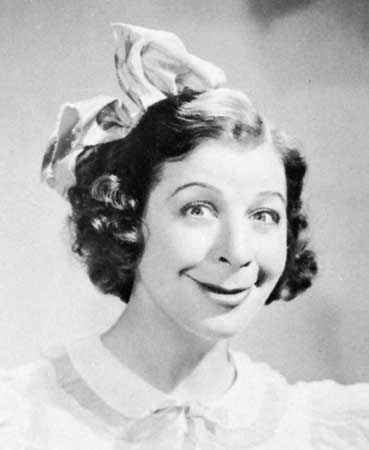Brice, Fanny
American actress
original name Fannie Borach
born Oct. 29, 1891, New York, N.Y., U.S.
died May 29, 1951, Los Angeles, Calif.
 popular American singing comedienne who was long associated with the Ziegfeld Follies.
popular American singing comedienne who was long associated with the Ziegfeld Follies.Brice appeared first at age 13 in a talent contest at Keeney's Theatre in Brooklyn, where she sang “When You Know You're Not Forgotten by the Girl You Can't Forget” and won first prize. In 1910 Florenz Ziegfeld (Ziegfeld, Florenz, Jr.) heard Brice singing in a burlesque house and made her a headliner in his Follies of that year. She was a Follies perennial after 1910, and her comic routines and parodies were highly popular.
Already famous as a comedienne, Brice first attained real stardom in the 1921 edition of the Follies, in which she introduced a French torch song, “My Man,” which became her trademark. Other songs identified with her were “Second Hand Rose,” “I Should Worry,” and “Rose of Washington Square.” She appeared with such major Broadway performers as W.C. Fields, Eddie Cantor, and Will Rogers in the Follies and in other shows. In Crazy Quilt (1931), she introduced the character of Baby Snooks, a mischievous brat she had first played in vaudeville in 1912. Baby Snooks later became a Follies favourite, and in that character Brice was featured on radio from 1936 until her death.
Brice also appeared in a few motion pictures, including My Man (1928), Be Yourself! (1930), The Great Ziegfeld (1936), and Everybody Sing (1938). Her life was the subject of the film Rose of Washington Square (1939) and of Funny Girl, a Broadway musical (1964) and a motion picture (1968).
Additional Reading
Herbert G. Goldman, Fanny Brice: The Original Funny Girl (1992); Barbara W. Grossman, Funny Woman: The Life and Times of Fanny Brice (1991).
- Juliana Rieser Force
- Julian Barnes
- Julian Bond
- Julian Bream
- Julian calendar
- Julian Eltinge
- Julian, George W.
- Julian Hedworth George Byng Byng of Vimy, Viscount
- Julian Hedworth George Byng, Viscount Byng of Vimy
- Julian Lowell Coolidge
- Julian Of Eclanum
- Julian of Norwich
- Julian, Percy L.
- Julian period
- Julian Przyboś
- Julian Schnabel
- Julian Seymour Schwinger
- Julian Steward
- Julian Trevelyan
- Julian Tuwim
- Julian Ursyn Niemcewicz
- Julia O'Faolain
- Julia Phillips
- Julia Roberts
- Julia Strudwick Tutwiler